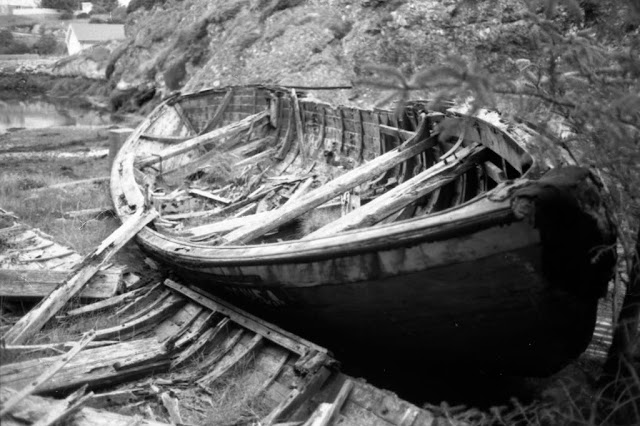Then everything just opened up, and we could not hear each other speak even though we were inside the cottage and everything. I mean this small house is very well insulated after all, but the wind, sea and the rain outside made one real lotofanoise. Just believe me!
Wind has calmed down now and the rain is no longer hammering the roof to pieces, but it's still both rainy and windy outside. Gray as well. You know the kind when you can't see further than halfway over the fjord and you feel like you live inside your own very small world stretching as far as a few kilometers in any direction. Anything outside of that is just something you can stay totally oblivious to. At least if you twist your mind a wee bit.
Some came home, some did not. This one was left to see it's last days hauled up on the coast to rotten away peacefully. Others were washed upon the shore torn to pieces long before they hit land. Nikon FM2, Kentmere 100 film.
So, you might think I talk a lot about the weather?
I do, and I know it. All people living along the coast of Norway talk a lot about the weather, and if this blog had been written by someone at my fathers age I'm sure it would be all about the weather. I have also discovered through the last 15 years or so that people from other places talk a lot about the weather as well. People living on the coast of the North Atlantic ocean and the North Sea talk a lot about it, and I don't think you can blame them. You usually don't have to look very far back in history to find one or more of your ancestors lost at sea when out there trying the best to feed their family when surprised by bad weather, or houses swept to sea by rockslides, landslides or an avalanche or something else weather and/or nature related. We live with weather each and every day, and historically the weather do things to us. It beats us up, one way or the other. Through generations we have been living on this small stripe of land between the steep mountains and the roaring sea, and it has done things to the way we think and act.
OK, so nowadays it's usually a matter of getting wet, freezing cold, too hot or something as trivial as that. Not too many years ago it was a matter of keeping yourself and your family alive or not. I know my grandfather had to struggle half the year to make sure he had peat and food enough for the approaching winter to keep his family warm and fed through the cold season. Living way out on an isolated island there was no way they could get anything from anywhere else should the weather really turn for the worse. And some years it did just that. Isolated them completely for weeks, and all you could do was living on the reserves built up through the periods of good weather.
The national monument over Oscar Tybring, the man who came up with the idea of having rescue vessels placed along the coast of Norway, from south to north. The monument was made by the artist Marit Lyckander and can be seen at the place my mother grew up, on this isolated outpost way out at sea. A natural place to have the monument placed, I would say. Thousands of lives has been taken by the sea just outside this island, and there are still more to be taken. That's just a fact, I'm sorry to say. On the bright side of it all I also know quite a few persons that has been rescued from the certain death of the rescue boats, the legacy of Oscar Tybring. We can say for sure that they have been a success, and Long May They Live the rescue boats.
Enough about the weather for now. I'm also writing another post parallel to this one, so I better just put this one online before I finish the next one and get on with a couple of things I promised to get done before my wife comes home from work.


I live in a place where the nearest ocean is about 700 miles away. Yet we talk about weather all the time here, too. Especially during tornado season every spring, and during snowstorm season every winter.
SvarSlettYes, Jim. I guess the weather is quite important to a lot of us, at least all the places around the globe where it actually can be threatening at times. After all that could just as well happen on hard ground as at sea or way up in the mountains or wherever. I've been through a few quite severe tornados back in the days when I was working on board a seismic vessel in the Gulf of Mexico. Rough winds they are for sure, and leaves an unmistakeable trace of disaster and horror behind before they slowly die away. Sometimes we get their last puffs over here, but by then they have become more or less toothless and quite weak.
SlettThe weather can take on quite a few different forms for sure, and when it gets extreme it's usually something to watch out for.
Weather is, as you know Roy, also a favourite topic of cnversation in Ireland. An island race...for centuries, as you say, the main means of transport was by boat - in the days before tracks could be made through dense forests. Great post, as usual...and you're getting nice results from that Kentmere film.
SvarSlett